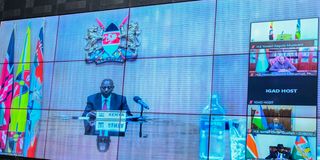Prime
Kenya pledges neutrality in seeking lasting peace in war-torn Sudan

President William Ruto chairs the virtual Intergovernmental Authority for Development (IGAD) meeting on the crisis in Sudan in this photo taken on April 16, 2023.
Kenya is pledging ‘neutrality’ in the Sudan conflict as regional bloc-Intergovernmental Authority on Development (IGAD), announced it will proceed to implement the decisions Summit on seeking peace, in spite of protestations from Khartoum over Nairobi’s leadership for the project.
On Monday, Kenya led a meeting of select four countries of the bloc, known as the quartet, to draw up a plan for the Sudan peace bid. Ethiopia, Djibouti and South Sudan, the other members of the quartet, attended.
The meeting said the quartet will proceed to implement the Sudan peace roadmap agreed on by IGAD last week during the Ordinary Assembly in Djibouti, in collaboration with the African Union and Sudanese parties and stakeholders, but which will be led by the Sudanese themselves.
A dispatch from the virtual meeting said the team will “ensure that all the concerns and requests of the Sudanese people are duly considered and addressed.
The four countries said they will “prioritise the realisation of a face-to-face meeting as a means of unlocking key issues namely the cessation of hostilities and delivery of humanitarian aid,” the three first issues identified in the roadmap.
But Kenya, besides leading the four countries, was also pledging neutrality.
A statement from the Ministry of Foreign and Diaspora Affairs in Nairobi said Kenya’s interest in the conflict is to see the violence end.
“As we have always stated Kenya’s only interest in Sudan is regional peace. We remain a neutral arbitrator on matters of peace for our neighbours as a precursor to the much sought-after development,” Kenya’s Foreign Ministry said.
Sudan had protested the decision to drop South Sudan as the leader of the quartet, and even rejected the IGAD proposal that the two protagonists; Abdel Fattah al-Burhan of the Sudan Armed Forces and Mohammed Daglo Hemedti of the Rapid Support Forces (RSF), meet face-to-face in any of the regional capitals.
Later last week, Sudan’s Ministry of Foreign Affairs accused Kenyan President William Ruto of ‘habouring’ the RSF, which Burhan now calls rebels. Officially, however, only the Summit of IGAD can reappoint the quartet and give a new roadmap. Yet the accusations may slow down the peace bid.
The Quartet said on Monday it will still go ahead to launch an all-inclusive political process aimed at achieving sustainable peace and peaceful transition to democracy and civilian rule “to be hosted by the Republic of Kenya in mid-July or the first week of August 2023.”
Dr Alfred Mutua, the Kenyan Cabinet Secretary for Foreign and Diaspora Affairs said the four countries are working together on the project.
“The IGAD process for bringing stability, peace and democracy to the great people of Sudan has begun with a firm commitment to implement the process arrived at during the Head of States meeting Djibouti, a week ago,” he said referring to the Summit on Monday last week.
“We discussed how to support the process of our Heads of State to hold a face to face meeting with the two leaders involved in the ongoing violence in Addis Ababa or agreed location.”
Khartoum, however, has protested to the international community, the apparent equal treatment of Burhan and his nemesis Hemedti. Burhan has asked to be treated as a bonafide head of state, a source told The EastAfrican on Monday, reflecting the dilemma mediators face in bringing the warring sides to the table.
At a session on Sudan at the UN Human Rights Council on Monday, the country’s Permanent Representative Hassan Hamed, asked the international community to stop speaking in “grey language.”
“…such as referring to what it calls "the two parties to the conflict" in an unfair and unfair attempt to equate the Sudanese National Army with the forces that rebelled against the state, and therefore (aids) the rebel forces persist in their violations in the light of not receiving any direct condemnation or condemnation,” he argued.
Last week, Khartoum said Burhan won’t meet with Hemedti face to face. Burhan and Hemedti had collaborated to overthrow a civilian transitional government back in October 2021. They were both condemned by the African Union and Sudan remains suspended from voting at the continental bloc.
The IGAD Quartet Group of countries was chaired by Dr Mutua and was attended by Djiboutian counterpart Mahamoud Ali Youssouf as Chair of the IGAD Council of Ministers; Ethiopian Deputy Prime Minister and Minister for Foreign Affairs Demeke Mekonnen, South Sudan’s Deng Dau Deng, IGAD Executive Secretary, Workneh Gebeyehu and Bankole Adeoye, the African Union Commissioner for Political Affairs, Peace and Security.





